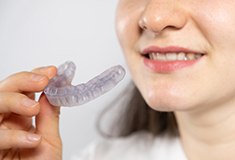
TMJ Treatment—Forest, VA
Reduce TMJ Pain & Improve Jaw Mobility

Your temporomandibular joints connect your jaw to your skull bone, allowing you to move your mouth to speak, chew, and smile. Unfortunately, these delicate joints can become damaged or strained, resulting in severe discomfort and restricting your jaw’s mobility. If you are experiencing this type of problem, please contact your dental team in Forest, and we can help repair the damage and reduce your chronic jaw discomfort so you can lead a pain-free life as soon as possible.
Why Choose Crossroads Family Dentistry for TMJ Treatment?
- Reduced TMJ pain & discomfort
- Multiple treatment options available
- Skilled and caring team of experts
What is TMJ Disorder?

Temporomandibular joint dysfunction (TMJ dysfunction) is a condition that affects the temporomandibular joints, muscles, and connective tissues surrounding the jaw. These work together to help you open and close your mouth to do things like chew food, speak, laugh, and sneeze.
Your temporomandibular joints connect the mandible (lower jaw) to the maxilla (upper jaw). When these joints become overworked due to bite problems, past oral trauma, or bruxism (teeth grinding) and sustain additional force, this can cause chronic pain and discomfort.
Symptoms of TMJ Disorder

There are several symptoms that are characteristic of TMJ dysfunction that you may experience. These include:
- Pain and tenderness in the jaw
- Lockjaw
- A clicking or popping sound when you open or close your mouth
- Earaches or ringing in the ear (tinnitus)
- Neck, shoulder, and back pain
- Pain or difficulty while chewing
- Pain behind the eyes
- Migraine headaches
- Changes in bite
Types of TMJ Treatment

In order to determine the best treatment options for your TMJ disorder, you will need to undergo a diagnostic examination with your dentist. This may include X-rays and a physical examination of your jaw. Once your dentist has evaluated your condition, he or she will discuss which solution or solutions may work best for you based on your unique needs. Because there are many underlying causes of TMJ disorder, including prior injury, genetics, or bruxism, the type of treatment you will need will depend on why you have the condition in the first place.
Occlusal Splint

An occlusal splint is an oral appliance that can help protect your teeth and jaw from the damaging effects of teeth grinding, which can make TMJ disorder symptoms worse. Occlusal splints shift the jaw slightly forward, helping your joints rest comfortably and providing long-term relief from tenderness and chronic pain.
Equilibration/Occlusal Adjustment

One of the most common causes of TMJ disorders is bite problems. These can sometimes occur when dental restorations or dental work isn’t properly cemented into the mouth, causing uneven distribution or force on the temporomandibular joints.
Occlusal adjustment involves calculating the patient’s bite and buffing down certain restorations or fillings that could be responsible for uneven biteforce. This in turn helps the facial muscles and connective tissues to relax.
TMJ Treatment FAQs
Can TMJ Be Cured Permanently?
Issues with your temporomandibular joints (TMJ) can sometimes subside on their own over time, but it’s important to seek professional treatment if symptoms persist or worsen. Some treatments, like BOTOX injections, provide temporary relief, but don’t address long-term concerns.
Our practice in Forest offers solutions, such as occlusal splints and occlusal adjustments/ equilibration, which are intended to fix the underlying cause of the issue for more permanent results. By improving your bite and jaw alignment, we can alleviate the extra tension being placed on your teeth and joints in order to provide some much-needed relief.
Is TMJ Treatment Safe?
Are you worried that your TMJ treatment might do more harm than good? Thankfully, these services are generally considered safe as long as they’re provided by a qualified professional. Some services, such as BOTOX injections for TMD, have been debated, but our team focuses on alternative solutions.
For instance, we can provide custom-fitted oral appliances that help bring your jaw into its correct position to reduce the pressure on the joints anchoring it to your skull. We can also make minimal changes to the shape of your enamel to achieve this effect.
How Long Does TMJ Treatment Take?
Are you wondering how long it will be before your TMJ treatment in Forest provides a well-earned reprieve? It can vary depending on your circumstances because different factors, like the severity of your condition and the type of treatment you choose, can impact the timeline.
Occlusal splints are often worn every night for several weeks or months, and you may notice changes in your symptoms gradually. They don’t often disappear all at once, but the pain relief that follows your treatment can potentially last a lifetime. Equilibration/occlusal adjustments vary widely depending on your individual situation, and might take more or less time to have an impact. Some patients require a single adjustment, while others require multiple visits to make incremental improvements.
Does Occlusal Adjustment for TMJ Hurt?
Occlusal adjustment involves filing down the biting surface of one or more teeth to ensure that your bite force is correctly distributed across your enamel. Our team will likely apply a local anesthetic to numb the area to help you feel comfortable during your appointment, but you might feel tender afterwards. This effect is usually temporary and resolves itself in a few days.
If you experience persistent or severe aches that don’t subside, please contact us right away so we can address it, which might involve an additional adjustment.